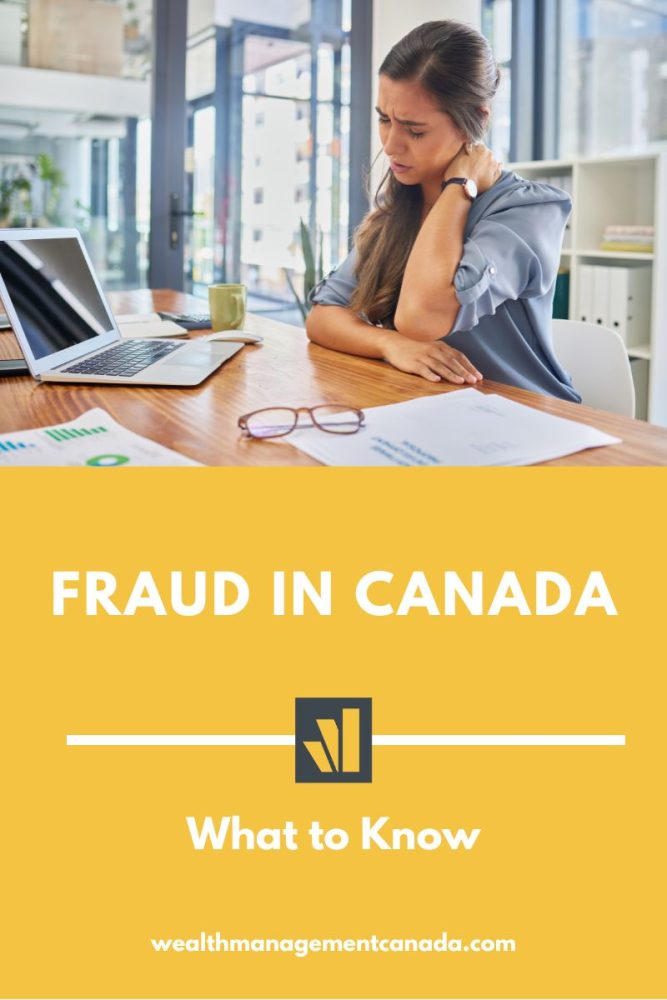Ever received a suspicious voicemail from the CRA? Then, when you call back the number to “pay your debt,” something just doesn’t feel right about the person on the other line. With Canada’s rising fraud rates, chances are that the suspicious call could swindle you of your personal information and money if you aren’t careful. You’d be surprised how common fraud is — the financial loss associated with it might bring feelings of insecurity, shame, and embarrassment. But that’s why security and risk management are so important in the wealth preservation strategies that Wealth Management Canada’s roster of wealth managers offer clients. Are you looking to understand the signs of fraud or even find relief after being defrauded? Keep reading for our expert take on fraud in Canada, how to spot it, and more!

Table of contents
What is fraud in Canada?
Fraud is a crime that uses some form of deception to secure monetary or other types of personal gain. Over 168,000 cases of fraud were reported in Canada in 2019, but that number is thought to have skyrocketed after a rise in fraudulent acts related to COVID-19 funds.

START WORKING WITH A WEALTH MANAGER NOW
Other Canada-specific types of fraud include people pretending to contact you from these Canadian agencies:
- Service Canada
- Canada Border Service Agency
- Immigration, Refugees, and Citizenships Canada
- Canada Revenue Agency (CRA)
Fraudsters might seek to defraud Canadians through many different channels, including phone, email, text, social media, mail, cryptocurrency exchanges, and even at your front door. Unfortunately, newcomers to Canada and elderly people are the most common targets for fraud.
Not sure if it’s fraud? Here are a few signs someone might try to defraud you:
- Requests for personal or financial details
- Immediate payment requests
- Suspicious links or senders
- Cryptocurrency or gift card payment requests
- Urgent or threatening language
Related Reading: ESG and Risk Management
Is fraud a criminal offence in Canada?
Yes, fraud is a criminal offence in Canada under Section 380 of the Canadian Criminal Code. Prosecuted offenders could face up to 14 years of prison time for cases with aggravated circumstances. Minor offences and first-time offences might receive sentences closer to the minimum 2-year prison sentence outlined in the code.
We mentioned COVID relief fund scams bringing fraud stats higher in Canada. Let’s look at more details about how fraud is evolving and increasing in the country.
Related Reading: What is a shell company?
Rising Fraud Rates in Canada
The RCMP recently reported that the amount of money Canadians have lost to fraud has reached a historic level. The catalyst? Evolved technology, which makes fraud easier to commit, more common, and more sophisticated. For instance, a person can easily and cheaply access editing software to produce fraudulent documents in an attempt to steal money from others.
The Canadian Anti-Fraud Centre recorded a whopping $530 million in financial losses related to fraud, which is significantly higher than the $380 million reported in 2021 (40% increase). The worst part? Most people don’t report fraud for a wide range of reasons, like feelings of shame or embarrassment, or fear of further loss in pursuing legal action.

START WORKING WITH A WEALTH MANAGER NOW
So, what kind of tech is indirectly fostering more fraud cases? Think of the next big thing and chances are, there’s a way for someone to abuse it. For example, QR codes have been making their way into most restaurants as an easy way to view a menu. Fraudsters are now sending unsuspecting Canadians QR codes in texts and emails to steal their information.
Another common environment for fraud? Car sales. We all saw how wild the used car market became after COVID-19. Well, turns out fraudsters took notice as well. One woman in Ottawa reported receiving plenty of inquiries for her son’s used car once she posted it on Autotrader.com. Many of them would ask her to purchase vehicle history reports to feel more comfortable purchasing the car. Once she insisted on her own report from trusted provider Carfax, she received much more hostile messages from the fraudsters with more urgency to purchase the one they had in mind.
Other common types of fraud that have increased in Canada include:
- Investment fraud: A fraudster will invite someone to invest on a cryptocurrency platform, and the initial investment will generate returns at a later date. After a while, the victim invests more money and eventually, all the funds disappear.
- Online dating fraud: Victims are more commonly over the age of 40. In this fraud type, criminals will begin online relationships with victims and try to get them to send them money.
- Emergency fraud: Have a daughter travelling in Mexico? It’s best you don’t post about it. Some fraudsters impersonate kidnappers and defraud victims of ransom money for their loved ones.
- Identity theft: This one isn’t going anywhere, and with more opportunities to steal your information via apps and cybercrime, identity theft continues to increase in prevalence in Canada.
Any of these sound familiar? Stop fraud in its tracks and report it.
Related Reading: Inflation and the Market: How do they interact?
How to Report Fraud in Canada
Unfortunately, very few instances of fraud are reported to the authorities. Perhaps because of shame or embarrassment, or fear that authorities won’t actually do anything making it a waste of time. But they’re here to help. Just follow these easy steps to report fraud in Canada to all the necessary parties:
- Collect information: Compile every piece of documentation that you can use as evidence that the fraud took place. Anything can help convict the perpetrators and locate them. Hold onto materials like telephone numbers and email addresses, web page and email printouts, receipts, IP addresses, conversation printouts, pamphlets or advertisements, and journaled details about the events.
- Report the fraud to your local police station: If you’ve lost any money or personal information, you should call your local authorities immediately. Remember to note down the detective and file number assigned to your case.
- Report the fraud to the Canadian Anti-Fraud Centre: This is a specialist agency within the government that deals with fraud on a daily basis. You can report fraud to them online or by phone at 1-888-495-8501.
- Report the fraud to your bank or any other involved bank: If you received a bounced cheque or someone withdrew any money from your account, let your bank know immediately. They might even offer insurance to help you recoup the funds or simply stop the payment if they catch it in time.
- Check your credit report: Fraudsters commonly take out new forms of credit with your financial information after defrauding you of personal information. Check your credit report to see if any new accounts have been opened, and if they have been, report the fraud to the credit bureau.
- Inform the business or website where the fraud took place: Online dating fraud often takes place on eHarmony, Tinder, and other popular dating platforms. You should also report the fraud to the app or website that the fraudster used to contact you. This could even look like Facebook, eBay, Kijiji, and others.
Learn more about how to report fraud in Canada.
Related Reading: A Closer Look at the State of Canada’s Housing Market

START WORKING WITH A WEALTH MANAGER NOW
Dealing with Fraud in Canada
Bottom line? Fraud in Canada is increasing especially compared to historical rates, and poses significant risk to your financial health. What’s more, the naturalization of technology has opened more and more doors for criminals to steal your personal information and use it to take out loans, credit cards, car loans, or even community identity theft.
The best way to protect yourself from fraud? Stay aware of changing fraud trends and regularly check the Canadian Anti-Fraud Center for tips and news. You should also practice cyber hygiene by changing your passwords regularly, enabling two-factor authentication, and installing a solid firewall on your computer.
As for the increasingly common investment fraud? No need to trust a stranger with your finances. Why not look at a roster of completely vetted, certified wealth management providers on Wealth Management Canada’s regularly updated website? We’ll connect you with seasoned professionals to give you informed financial advice and strategize a wealth preservation plan that meets your needs. And if you’ve already been a victim to fraud? We can help you back on your feet with services to protect your existing assets. Find a wealth manager today!
Read More: What is Private Debt?